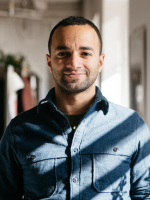RACHEL MARTIN, HOST:
Selfies have come to represent some of the worst aspects of social media, a photographic representation of the most obnoxious and narcissistic online behavior. But reporter Ryan Kailath says there is another side to the selfie story.
RYAN KAILATH, BYLINE: Two years ago, Esme Wang walked into her bedroom, woke up her husband and said hey.
ESME WANG: I'm dead and you're dead, but it's OK because now we're in the afterlife.
KAILATH: This was the onset of Cotardâs Delusion where a person actually believes they're dead. Esme suffered the delusion for months. She'd stopped working, stopped eating and showering and of course saw a psychiatrist.
WANG: We had tried basically every antipsychotic on the market, but those were not working.
KAILATH: Out of boredom and depression, Esme started to photograph herself - a lot. And one photo stood out. She had reached around and taken a picture of the back of her neck where she happens to have a distinctive birthmark.
WANG: I saw the photo and that birthmark and it got through a little bit, just to say this is you. You exist and here is the proof.
KAILATH: Esme's delusion gradually started to lift, thanks in part to the power of the selfie. And if the power of the selfie sounds like a stretch, well, then, journalist Rachel Syme has news for you.
RACHEL SYME: I don't think it is a stretch to say that selfies are powerful or tools of healing or empowering. And not everybody is experiencing the kind of delusion that Esme was going through at the time. But people do want to confirm themselves as real people that take up space in this world
KAILATH: Rachel Syme has been writing and reporting about selfies all year.
SYME: I ask people to send me their selfies and the stories behind them, and every time I did that, I got hundreds of responses.
KAILATH: She recently published some of those responses, along with an essay on selfie culture in the online magazine Matter.
SYME: I started to see that there was a lot more going on than just, oh, hey, I look hot today. Click on my face if you think I look great.
KAILATH: Take Bethany Rutter, who I reached in London.
BETHANY RUTTER: You can't hear this on the radio, but I am fat and 100 percent selfies are an empowerment device for me.
KAILATH: Bethany posts a lot of selfies, every time she has new lipstick on or likes what her hair is doing or wants to show off a new piece of clothing. She says it's a way of affirming her beauty and accepting her body, which she didn't always.
RUTTER: And it's really only been in the last few years since I kind of discovered body positivity and really taken control of what I want to look like and how I want to present myself that I have really, truly, 100 percent got to the loving myself phase of my life.
KAILATH: Rachel Syme says this is one of the most important and overlooked ways that selfies are used.
SYME: Selfies are a way to show people how you want to be seen, and that is not a narcissistic act. That's an act of communication.
KAILATH: So next time you see someone turn the camera on themself, keep in mind there may be more going on there than just vanity. That selfie taker might be totally normal, a shy kid on the first day of school, a gay person in an awkward environment or a plus-sized woman feeling beautiful in her new dress and marking the moment, the unlooked at making themselves seen. For NPR News, I'm Ryan Kailath. Transcript provided by NPR, Copyright NPR.


